外研版必修四Module 3 body language Cultural cornerand language points课件(共19张PPT)
文档属性
| 名称 | 外研版必修四Module 3 body language Cultural cornerand language points课件(共19张PPT) |
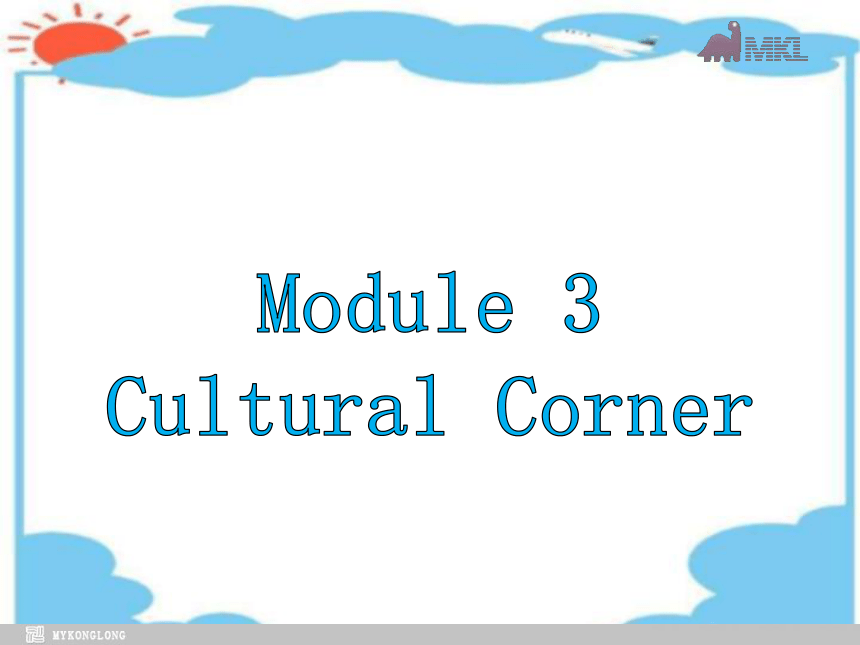
|
|
| 格式 | zip | ||
| 文件大小 | 1.8MB | ||
| 资源类型 | 教案 | ||
| 版本资源 | 外研版 | ||
| 科目 | 英语 | ||
| 更新时间 | 2020-06-08 17:47:29 | ||
图片预览

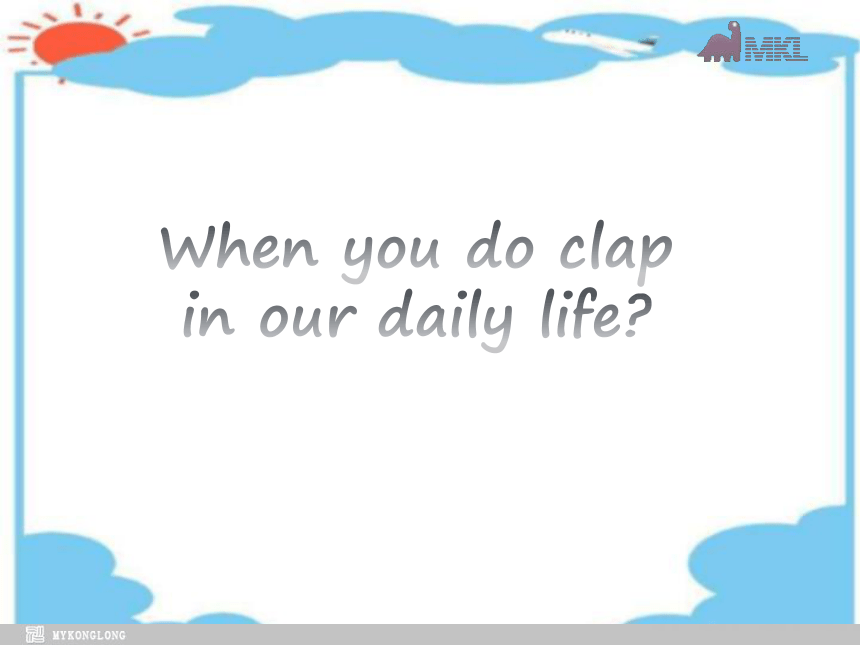
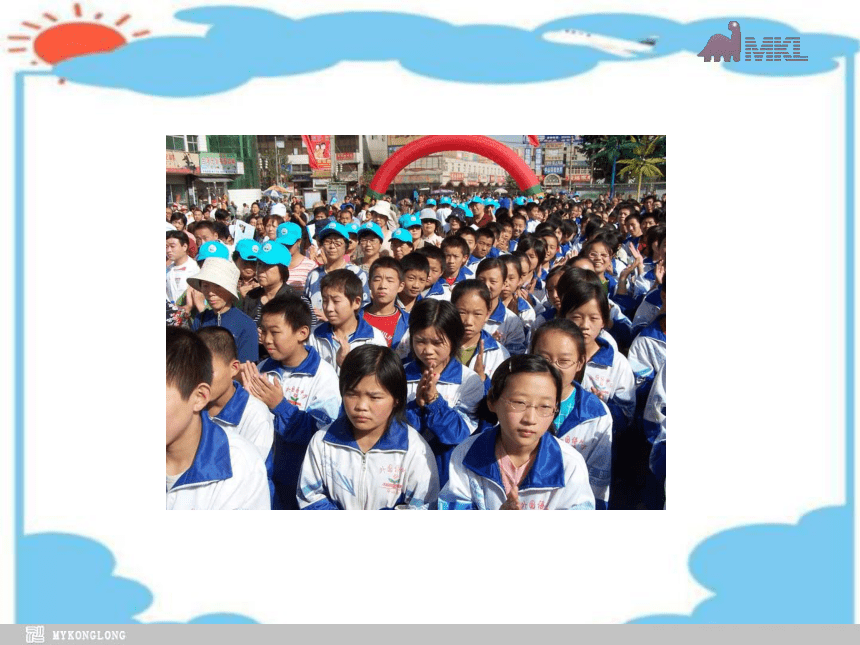
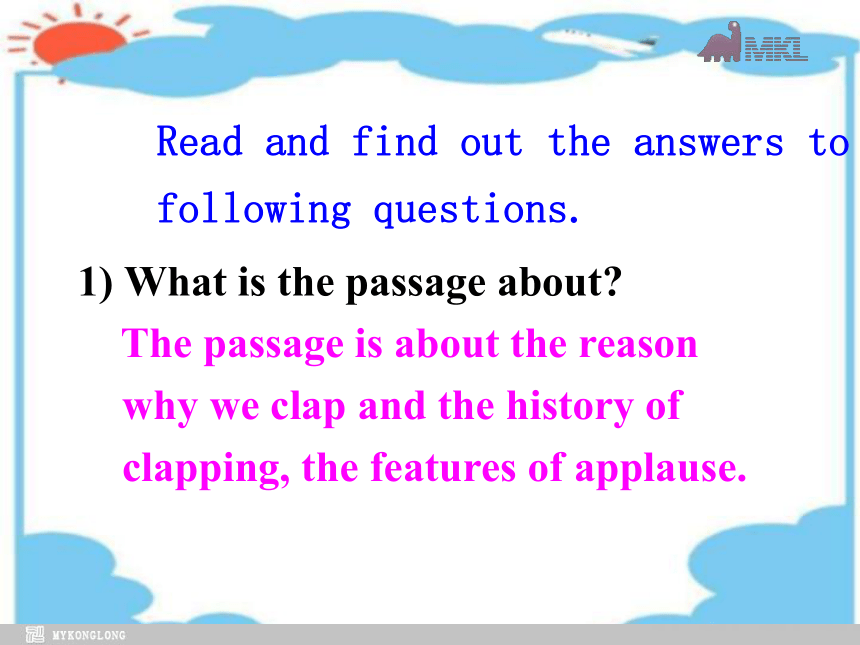

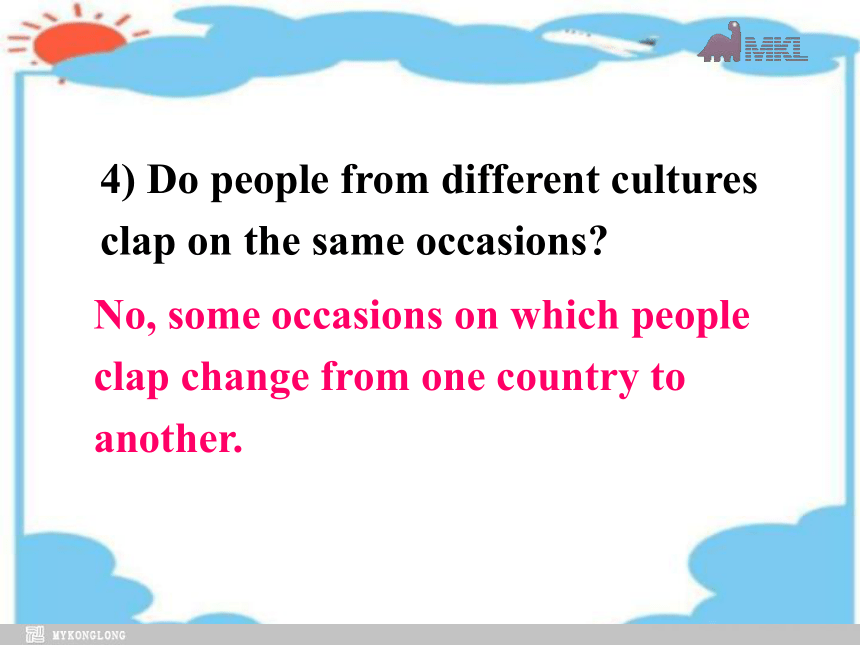
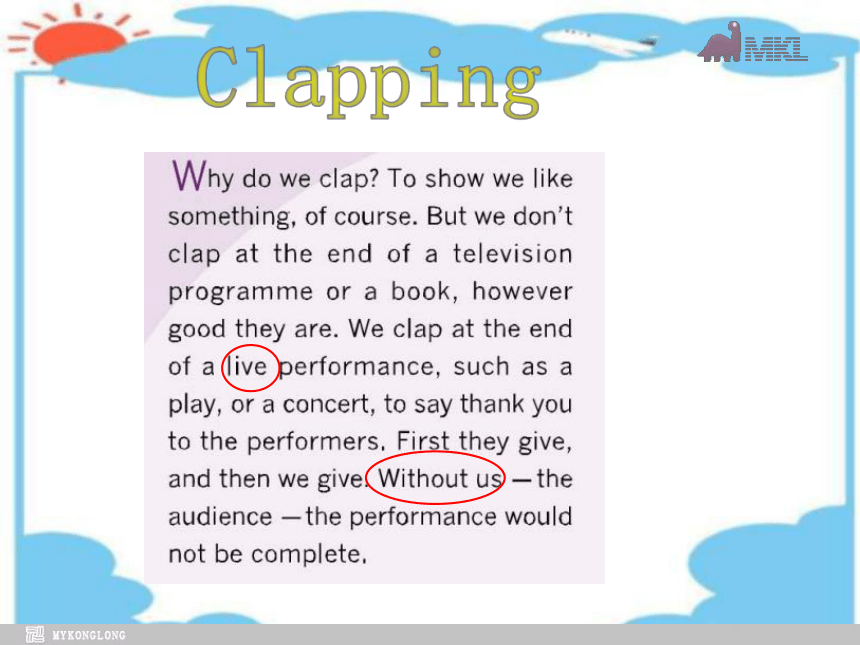
文档简介
(共19张PPT)
Module
3
Cultural
Corner
When
you
do
clap
in
our
daily
life?
Read
and
find
out
the
answers
to
the
following
questions.
1)?What
is
the
passage
about?
The
passage
is
about
the
reason
why
we
clap
and
the
history
of
clapping,
the
features
of
applause.
2)?Why
do
people
clap?
3)
How
many
countries
are
mentioned
in
the
passages?
To
show
that
they
like
something.
Three
countries.
4)
Do
people
from
different
cultures
clap
on
the
same
occasions?
No,
some
occasions
on
which
people
clap
change
from
one
country
to
another.
Clapping
1.live
adj.现场的;活着的;有生气的;现场直播的adv.在表演现场;现场直播
We
clap
at
the
end
of
a
live
performance,such
as
a
play,or
a
concert,to
say
thank
you
to
the
performers.
我们在现场表演结束时鼓掌,比如说一场戏剧、一场音乐会,来向表演者致意。
live
“活的,有生命的”,只作前置定语,一般用来指动物或植物;还可指“现场直播的”。
alive
“活的,有生命的”,作后置定语,也可作表语。
living
“活的,有生命的”,作前置、后置定语,也可作表语。
lively
“活泼的,快活的,生动的”,可以指人或物,可作定语、表语。
2.Without
us—the
audience—the
performance
would
not
be
complete.
没有我们观众,表演就不会完美。
本句为含蓄条件句,介词短语引出虚拟条件,此处without
us相当于if
it
were
not
for
us。
We
would
feel
lonely
without
any
friend.
没有朋友我们会觉得孤独。
含蓄条件句中,虚拟条件常由without;
but
for,otherwise等引出,本句叙述的是与现在事实相反的情况,所以主句的谓语动词用would+动词原形。如果是与过去事实相反的情况,主句的谓语动词用could/would+have
done。
Without
your
help,we
couldn’t
have
succeeded.(without
your
help=if
you
had
not
helped
us)
如果没有你的帮助,我们不可能成功。
He
was
busy;or/otherwise
he
would
have
helped
you.
他很忙,否则他会帮助你的。
But
for
the
Party’s
leadership,we
couldn’t
lead
a
happy
life.要不是党的领导,我们不可能过上这样的幸福生活。
I
through
that
bitter
period
without
your
generous
help.
A.couldn't
have
gone
B.didn't
go
C.wouldn't
go
D.hadn't
gone
【解析】 考查虚拟语气。英语中,without,with,or,otherwise或under等可构成委婉虚拟语气,此时句中的谓语动词应用should/could/would+动词原形(与现在或将来事实相反)或should/could/would+have+过去分词(与过去事实相反)。据此可知A项当选。句意:假如当时没有您慷慨相助,我就不会度过那段艰难的时期。
【答案】 A
prolong
vt.
延长……,
拉长……
mean
doing
意味着做某事
mean
to
do
sth.
打算做某事
hold
v.
握住,
拿着,
持有,
容纳,
占领,支撑住
有……兴趣
n.
把握,
控制,
船舱
on
this/that
occasion
此时/彼时
on
one
occasion
有一次
infectious
adj.
有感染力的,
传染的
equality:
n.
同等,平等
1.But
some
occasions
on
which
people
clap
change
from
one
country
to
another.
但是人们鼓掌的一些场合因不同国家的不同而有所不同。
句中on
which
people
clap
change
from
one
country
to
another是“介词+which”引导的定语从句,修饰occasion,on
which在句子中作状语,相当于when。
She
still
remembers
the
day
on
which(=when)
she
won
the
prize.她仍然记得她获奖的那一天。
The
man
to
whom
you
spoke
just
now
is
a
relative
of
my
aunt’s.
This
is
the
house
in
which
I
lived
for
ten
years.
【提示】 occasion作先行词,当表示“时刻;时机”时,定语从句常用when来引导;当表示“(事情发生的)场合”时,定语从句用where引导。situation,case也表示“情况,情形”,后接定语从句时要用in
which
或where,这种用法是定语从句的重点也是高考热点。
Have
you
sent
thank?you
notes
to
the
relatives
from
you
received
gifts?
A.which
B.them
C.that
D.whom
【解析】 考查“介词+关系代词”引导的定语从句。句意:你从亲戚那儿收到了礼物后,有没有给他们发感谢信?介词+关系代词中只能用which或whom。根据先行词是relatives(亲戚),为人,故选whom。
【答案】 D
Thank
you!
Module
3
Cultural
Corner
When
you
do
clap
in
our
daily
life?
Read
and
find
out
the
answers
to
the
following
questions.
1)?What
is
the
passage
about?
The
passage
is
about
the
reason
why
we
clap
and
the
history
of
clapping,
the
features
of
applause.
2)?Why
do
people
clap?
3)
How
many
countries
are
mentioned
in
the
passages?
To
show
that
they
like
something.
Three
countries.
4)
Do
people
from
different
cultures
clap
on
the
same
occasions?
No,
some
occasions
on
which
people
clap
change
from
one
country
to
another.
Clapping
1.live
adj.现场的;活着的;有生气的;现场直播的adv.在表演现场;现场直播
We
clap
at
the
end
of
a
live
performance,such
as
a
play,or
a
concert,to
say
thank
you
to
the
performers.
我们在现场表演结束时鼓掌,比如说一场戏剧、一场音乐会,来向表演者致意。
live
“活的,有生命的”,只作前置定语,一般用来指动物或植物;还可指“现场直播的”。
alive
“活的,有生命的”,作后置定语,也可作表语。
living
“活的,有生命的”,作前置、后置定语,也可作表语。
lively
“活泼的,快活的,生动的”,可以指人或物,可作定语、表语。
2.Without
us—the
audience—the
performance
would
not
be
complete.
没有我们观众,表演就不会完美。
本句为含蓄条件句,介词短语引出虚拟条件,此处without
us相当于if
it
were
not
for
us。
We
would
feel
lonely
without
any
friend.
没有朋友我们会觉得孤独。
含蓄条件句中,虚拟条件常由without;
but
for,otherwise等引出,本句叙述的是与现在事实相反的情况,所以主句的谓语动词用would+动词原形。如果是与过去事实相反的情况,主句的谓语动词用could/would+have
done。
Without
your
help,we
couldn’t
have
succeeded.(without
your
help=if
you
had
not
helped
us)
如果没有你的帮助,我们不可能成功。
He
was
busy;or/otherwise
he
would
have
helped
you.
他很忙,否则他会帮助你的。
But
for
the
Party’s
leadership,we
couldn’t
lead
a
happy
life.要不是党的领导,我们不可能过上这样的幸福生活。
I
through
that
bitter
period
without
your
generous
help.
A.couldn't
have
gone
B.didn't
go
C.wouldn't
go
D.hadn't
gone
【解析】 考查虚拟语气。英语中,without,with,or,otherwise或under等可构成委婉虚拟语气,此时句中的谓语动词应用should/could/would+动词原形(与现在或将来事实相反)或should/could/would+have+过去分词(与过去事实相反)。据此可知A项当选。句意:假如当时没有您慷慨相助,我就不会度过那段艰难的时期。
【答案】 A
prolong
vt.
延长……,
拉长……
mean
doing
意味着做某事
mean
to
do
sth.
打算做某事
hold
v.
握住,
拿着,
持有,
容纳,
占领,支撑住
有……兴趣
n.
把握,
控制,
船舱
on
this/that
occasion
此时/彼时
on
one
occasion
有一次
infectious
adj.
有感染力的,
传染的
equality:
n.
同等,平等
1.But
some
occasions
on
which
people
clap
change
from
one
country
to
another.
但是人们鼓掌的一些场合因不同国家的不同而有所不同。
句中on
which
people
clap
change
from
one
country
to
another是“介词+which”引导的定语从句,修饰occasion,on
which在句子中作状语,相当于when。
She
still
remembers
the
day
on
which(=when)
she
won
the
prize.她仍然记得她获奖的那一天。
The
man
to
whom
you
spoke
just
now
is
a
relative
of
my
aunt’s.
This
is
the
house
in
which
I
lived
for
ten
years.
【提示】 occasion作先行词,当表示“时刻;时机”时,定语从句常用when来引导;当表示“(事情发生的)场合”时,定语从句用where引导。situation,case也表示“情况,情形”,后接定语从句时要用in
which
或where,这种用法是定语从句的重点也是高考热点。
Have
you
sent
thank?you
notes
to
the
relatives
from
you
received
gifts?
A.which
B.them
C.that
D.whom
【解析】 考查“介词+关系代词”引导的定语从句。句意:你从亲戚那儿收到了礼物后,有没有给他们发感谢信?介词+关系代词中只能用which或whom。根据先行词是relatives(亲戚),为人,故选whom。
【答案】 D
Thank
you!
